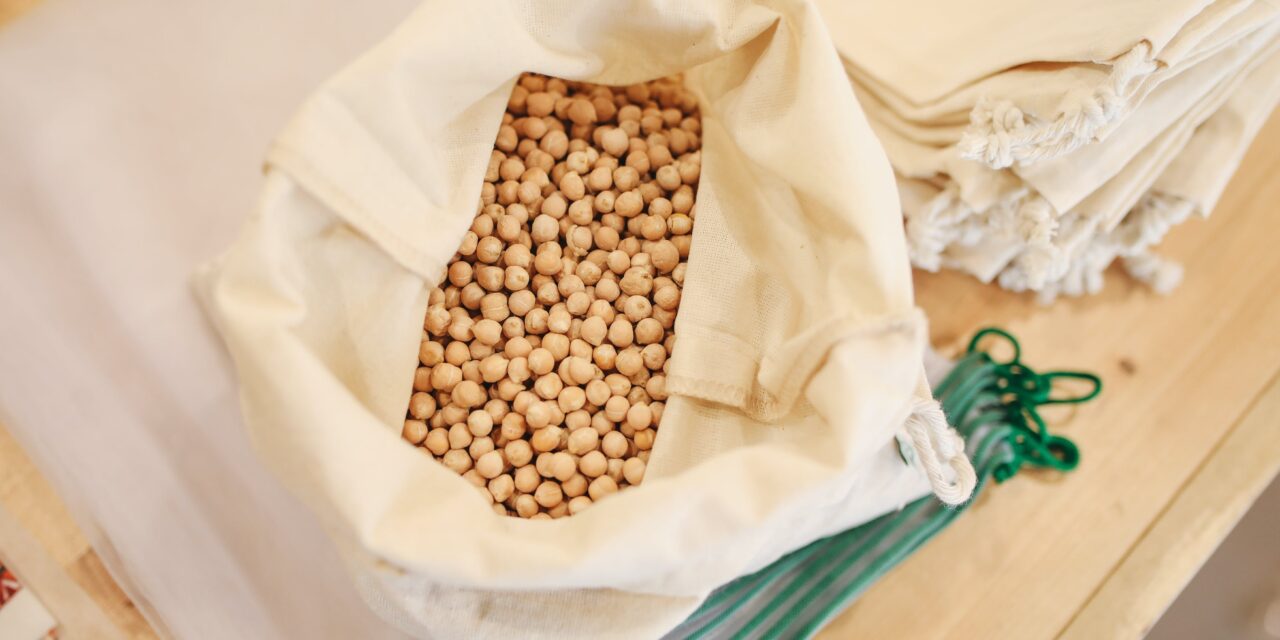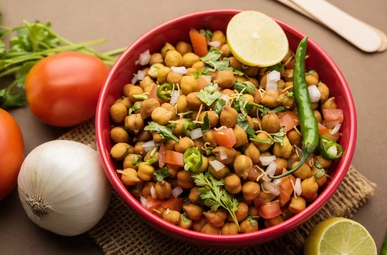Chickpeas, often known as garbanzo beans, are legumes belonging to the family Fabaceae. These tiny, round, beige-colored beans are a common component in many different cuisines because of their nutty flavor and gritty texture.
Over 7,000 years of history have seen chickpeas play a significant role in the diets of ancient civilizations. These beans have maintained populations and gained a position in culinary traditions throughout the Mediterranean and the Middle East.
Types of Chickpeas:
Chickpeas come in two main types:
- Kabuli
- Desi
Kabuli Chickpeas:
Larger, Kabuli chickpeas have a smoother coat, making them easily distinguishable.
Desi Chickpeas:
Smaller and characterized by a rough coat, Desi Chickpeas offer a different texture and appearance compared to their Kabuli counterparts.
1. Full of Nutrients:
In addition to their macronutrient content, chickpeas provide a plethora of vitamins and minerals, making them a nutrient-dense choice. A 1-cup (164-gram) serving of cooked chickpeas offers:
Calories: 269
Protein: 14.5 grams
Fat: 4 grams
Carbs: 45 grams
Fiber: 12.5 grams
Manganese: 74%
Folate (vitamin B9): 71%
Copper: 64%
Iron: 26%
Zinc: 23%
Phosphorus: 22%
Magnesium: 19%
Thiamine: 16%
Vitamin B6: 13%
Selenium: 11%
Potassium: 10%
2. Source of Fullness:
Chickpeas stand out as a significant source of satiety and fullness, thanks to their exceptional nutritional composition. These petite legumes boast a harmonious blend of complex carbohydrates, fiber, and protein, creating a satisfying and enduring sense of contentment post-consumption. The abundant fiber aids in maintaining regular digestion, mitigating blood sugar spikes, and preventing subsequent crashes that often trigger hunger. Moreover, the synergistic effect of protein and fiber in chickpeas assists individuals in their pursuit of a healthier lifestyle, aiding in weight management by curbing excessive snacking tendencies. In essence, chickpeas emerge not just as a flavorful addition to various dishes but also as a valuable ally in promoting prolonged satisfaction and overall nutritional well-being.
3. Help in Weight Management:
Chickpeas prove to be an excellent companion for those navigating weight management goals. Bursting with a wholesome blend of fiber, protein, and complex carbohydrates, these legumes offer sustained feelings of satisfaction and fullness. Their high fiber content not only promotes a well-functioning digestive system but also curbs unnecessary snacking by fostering a sense of satiety. Additionally, the protein in chickpeas is pivotal for preserving muscle mass and plays a crucial role in appetite control. As a nutrient-dense and low-calorie food choice, chickpeas present a sensible option for individuals dedicated to weight control without compromising on nutritional quality. Whether integrated into vibrant salads, infused into a fragrant stir-fry or savored as a crispy roasted snack, chickpeas present delectable and nutritious meals to support weight management objectives.
4. Control Blood Sugar level:
Chickpeas play a supportive role in the regulation of blood sugar levels. Their notable combination of complex carbohydrates, fiber, and protein contributes to a slower and more sustained release of glucose into the bloodstream after consumption. This gradual release helps prevent sudden spikes in blood sugar, promoting a more stable and balanced glucose response. The high fiber content in chickpeas is particularly beneficial, as it aids in slowing down the absorption of sugar, supporting better blood sugar control. As a result, incorporating chickpeas into meals can be a strategic and flavorful choice for individuals looking to manage blood sugar levels effectively, offering a wholesome and nutritious option that aligns with overall health and well-being.
5. Help in Digestion:
Chickpeas stand out as digestive champions, offering a myriad of benefits for gut health. Packed with dietary fiber, these legumes act as a natural regulator, promoting regular bowel movements and preventing constipation. The soluble fiber content aids in the formation of a healthy gut environment by nourishing beneficial bacteria, contributing to a balanced microbiome. Additionally, chickpeas’ digestive-friendly properties help in the absorption of nutrients, ensuring optimal nutrient utilization by the body. Whether enjoyed in salads, stews, or hummus, incorporating chickpeas into your diet is a flavorful and nutritious way to support digestive wellness. The combination of fiber and other nutrients makes chickpeas a reliable and tasty choice for individuals seeking to enhance their overall digestive health and maintain a happy and well-functioning gut.
6. Chickpeas for Heart Health:
Chickpeas, often underestimated due to their small size, wield significant influence on heart health. These legumes are nutritional powerhouses, rich in fiber, essential vitamins, and minerals. The soluble fiber in chickpeas acts as a sponge, effectively reducing cholesterol levels by absorbing and eliminating excess cholesterol. Additionally, the potassium content contributes to maintaining optimal blood pressure, a vital aspect of cardiovascular health. For those aiming to manage weight, chickpeas prove invaluable, offering a blend of protein and fiber that fosters a feeling of fullness and curtails unhealthy snacking habits. Beyond being a pantry staple, incorporating chickpeas into your diet not only supports heart health but also adds a delightful touch to your culinary endeavors. Consider chickpeas not just as an ingredient but as a heart-friendly ally that can positively impact your overall well-being.
7. Chickpeas for Brain Health:
Chickpeas, those small yet mighty legumes, extend their beneficial influence beyond the dinner plate, reaching into the realm of brain health. Packed with nutrients crucial for cognitive function, chickpeas offer a brain-boosting arsenal. The high levels of folate in chickpeas contribute to the production of neurotransmitters, aiding in communication between nerve cells and supporting overall cognitive processes. Additionally, chickpeas contain a wealth of magnesium, a mineral known for its role in enhancing memory and learning abilities. The complex carbohydrates found in chickpeas provide a steady release of glucose, offering a sustained energy source for the brain. As we explore the intricate connection between nutrition and brain health, it becomes clear that incorporating chickpeas into our diets is not just a flavorful choice but a smart one for fostering cognitive well-being. So, let your love for chickpeas extend to nourishing not just your taste buds but also your brain.
8. Chickpeas for Bones Health:
Calcium, a vital mineral crucial for maintaining robust and well-functioning bones, is commonly linked to dairy products. However, chickpeas present themselves as an unexpected and valuable reservoir of this essential nutrient. Ensuring an adequate intake of calcium is imperative to bolster bone density and stave off conditions like osteoporosis, particularly as individuals advance in age. Chickpeas stands out as an excellent plant-based source of calcium, contributing significantly to promoting healthy bones. This is particularly advantageous for vegetarians or vegans who may face challenges accessing conventional dairy options. The substantial calcium content in chickpeas is pivotal for shaping and sustaining bone structure, acting as a safeguard against fractures and other bone-related issues. Incorporating chickpeas into your diet provides a straightforward yet potent method to ensure you meet your calcium requirements, ultimately enhancing the strength and resilience of your bones.
Conclusion:
In conclusion, chickpeas, often celebrated for their culinary versatility, emerge as nutritional powerhouses with an array of health benefits. From their rich history spanning over 7,000 years to their dual varieties, Kabuli and Desi, chickpeas have proven to be more than just a pantry staple. Boasting an impressive nutrient profile, they deliver essential vitamins and minerals, making them a smart and nutrient-dense choice for those mindful of their health. Chickpeas not only stand out for their role in promoting fullness but also as an excellent source of plant-based protein, supporting muscle health, and satisfying dietary needs. Moreover, their potential to aid weight management, control blood sugar levels, benefit digestion, contribute to heart and brain health, and sports bone health underscores their value as a holistic and delicious addition to any diet. So, as you savor the next chickpea-infused dish, relish not only the flavor but also the wholesome benefits that these tiny legumes bring to the table, enriching both body and palate.













Recent Comments